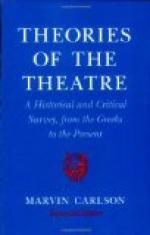Galeotto fu’l libro e chi lo scrisse,
which may be translated, “The book and the author of it performed for us the service of Gallehault.” Now Echegaray, desiring to retell in modern terms the old familiar story of a man and a woman who, at first innocent in their relationship, are allured by unappreciable degrees to the sudden realisation of a great passion for each other, asked himself what force it was, in modern life, which would perform for them most tragically the sinful service of Gallehault. Then it struck him that the great Gallehault of modern life—El Gran Galeoto—was the impalpable power of gossip, the suggestive force of whispered opinion, the prurient allurement of evil tongues. Set all society to glancing slyly at a man and a woman whose relation to each other is really innocent, start the wicked tongues a-babbling, and you will stir up a whirlwind which will blow them giddily into each other’s arms. Thus the old theme might be recast for the purposes of modern tragedy. Echegaray himself, in the critical prose prologue which he prefixed to his play, comments upon the fact that the chief character and main motive force of the entire drama can never appear upon the stage, except in hints and indirections; because the great Gallehault of his story is not any particular person, but rather all slanderous society at large. As he expresses it, the villain-hero of his drama is Todo el mundo,—everybody, or all the world.
This, obviously, is a great idea for a modern social drama, because it concentrates within itself many of the most important phases of the perennial struggle between the individual and society; and this great idea is embodied with direct, unwavering simplicity in the story of the play. Don Julian, a rich merchant about forty years of age, is ideally married to Teodora, a beautiful woman in her early twenties, who adores him. He is a generous and kindly man; and upon the death of an old and honored friend, to whose assistance in the past he owes his present fortune, he adopts into his household the son of this friend, Ernesto. Ernesto is twenty-six years old; he reads poems and writes plays, and is a thoroughly fine fellow. He feels an almost filial affection for Don Julian and a wholesome brotherly friendship for Teodora. They, in turn, are beautifully fond of him. Naturally, he accompanies them everywhere in the social world of Madrid; he sits in their box at the opera, acting as Teodora’s escort when her husband is detained by business; and he goes walking with Teodora of an afternoon. Society, with sinister imagination, begins to look askance at the triangulated household; tongues begin to wag; and gossip grows. Tidings of the evil talk about town are brought to Don Julian by his brother, Don Severo, who advises that Ernesto had better be requested to live in quarters of his own. Don Julian nobly repels this suggestion as insulting; but Don Severo persists that only by such a course may the family name be rendered unimpeachable upon the public tongue.




